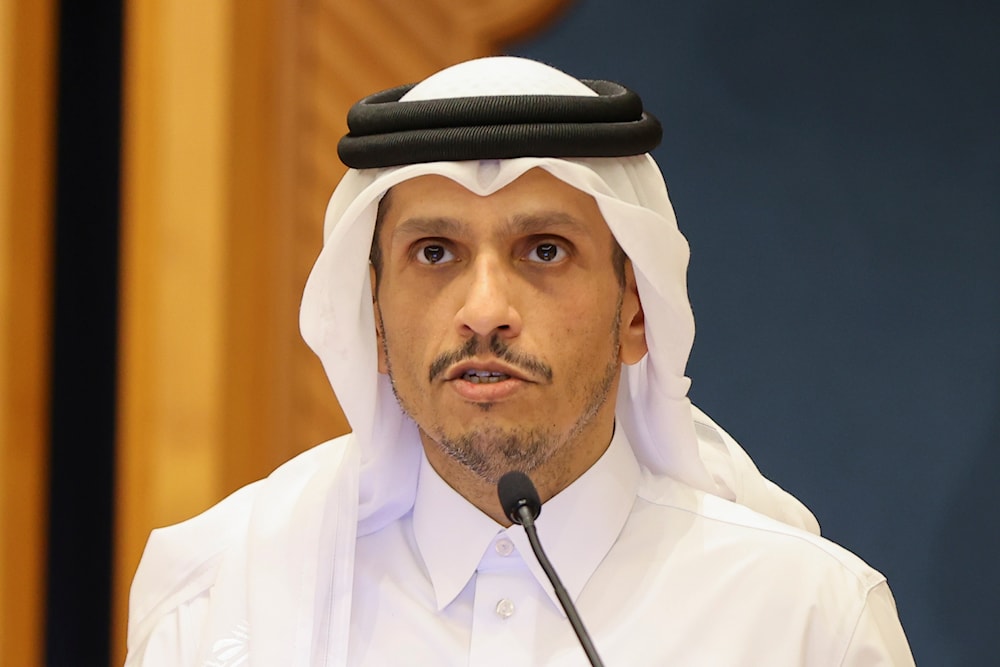Gulf states would run out of water if Iranian nuclear sites attacked
Qatar's Prime Minister says during an interview with Tucker Carlson that an attack on Iran's Bushehr nuclear facility would contaminate all of the water in the Gulf.
-

Qatar's Prime Minister and Foreign Minister Sheikh Mohammed Bin Abdulrahman al-Thani speaks at a joint press conference with the US secretary of state in Doha, Qatar, on June 12, 2024. (AP)
The Qatari Prime Minister said on Friday that countries in the Gulf could run out of water within days should Iran's nuclear facilities be attacked by "Israel" or the United States.
Sheikh Mohammed bin Abdulrahman bin Jassim Al Thani was asked during his interview with Tucker Carlson what would the fate of the Gulf sea be should the Bushehr Nuclear power plant ever be attacked, where he said it would lead to an "environmental catastrophe."
“This would be basically entirely contaminated…The whole country would run out of water in three days,” he said, adding, “This is not only applied for Qatar, it is applied for Kuwait, for the UAE, for all of us in that part," the Qatari Prime Minister explained.
Qatar’s Prime Minister Mohammed bin Abdulrahman al-Thani, in an interview with US journalist Tucker Carlson, said that if Iran's nuclear facilities are attacked, the Persian Gulf Arab countries will run out of water within three days due to water contamination. pic.twitter.com/sNzHsyI3mZ
— PressTV Extra (@PresstvExtra) March 8, 2025
The Qatari PM's statement comes amid heightened tensions between the United States and Iran as the Trump administration pushes its "maximum pressure" sanction strategy on Tehran to deter it from producing nuclear weapons.
Trump 'sends letter to Iran' for nuclear deal
Trump claimed on March 7 that he sent a letter to Iran's Leader Ayatollah Sayyed Ali Khamenei, proposing negotiations for a new nuclear deal between the two countries in an interview with Fox News, where he said that he hopes Iran will negotiate because it's going to be a lot better for Iran."
In 2018, Trump withdrew from the Joint Comprehensive Plan of Action (JCPOA), a deal that traded sanction relief on Iran for limitations on the Iranian nuclear program. Trump reimposed sanctions on Iran, prompting Iran to reduce its compliance with the JCPOA.
Iran's mission to the United Nations denied Trump's claim on March 7, "We have not received such a letter so far," an Iranian spokesperson told Novosti RIA upon being asked if they received Trump's letter calling for negotiations.
Iran has reiterated its rejection of direct talks between Tehran and Washington amid Trump's "maximum pressure" campaign, which was reimposed by Trump in February of 2025, heavily sanctioning Iran's oil, banking, and other key industries.
Iranian foreign minister Abbas Araghchi reaffirmed Iran's stance on March 7, stating that Tehran will not negotiate with Washington over its nuclear program so long as Trump maintains his maximum pressure approach.
"You cannot destroy a nuclear program through an attack; it is a technology we have achieved, and knowledge ingrained in minds cannot be bombed," Araghchi stated, adding that any Israeli attacks on Iran's nuclear facilities will trigger a wider conflict that will affect the entire region.

 3 Min Read
3 Min Read








